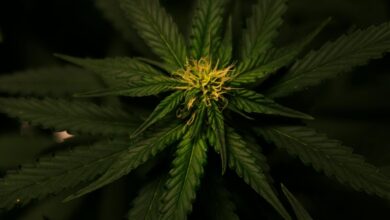What Is Cbd and Thc

Cannabidiol (CBD) and tetrahydrocannabinol (THC) are two of the most researched compounds derived from cannabis. CBD is recognized for its therapeutic effects without psychoactive properties, while THC is known for its intoxicating impact. Their differing roles and applications raise important questions about their benefits, risks, and legal implications. Understanding these distinctions is crucial for those considering their use for wellness or recreational purposes. What other factors should be taken into account?
Understanding CBD: Benefits and Uses
Although often associated with cannabis, cannabidiol, commonly known as CBD, is a non-psychoactive compound that has garnered significant attention for its potential therapeutic benefits.
Research indicates that CBD may offer various health benefits, including pain relief, anxiety reduction, and anti-inflammatory properties.
Its therapeutic uses extend to conditions such as epilepsy and insomnia, making it a subject of interest for those seeking alternative health solutions.
The Role of THC: Effects and Applications
Exploring the effects of tetrahydrocannabinol (THC) reveals its significant role in the cannabis plant, particularly due to its psychoactive properties.
THC's ability to induce euphoria and alter perception contributes to its popularity recreationally.
Additionally, its medical applications include pain relief, appetite stimulation, and anxiety reduction, highlighting its potential benefits for therapeutic use, despite the complexity of its psychoactive effects on individuals.
Key Differences Between CBD and THC
THC and CBD, both prominent cannabinoids found in cannabis, exhibit distinct chemical structures and effects that set them apart.
THC is known for its psychoactive properties and higher potency, while CBD offers therapeutic benefits without intoxication.
The process of CBD extraction often yields products aimed at wellness, contrasting with THC's recreational use, highlighting the divergent applications and societal perceptions of these cannabinoids.
Legal Status and Accessibility of CBD and THC
How do legal frameworks shape the accessibility of CBD and THC across different regions?
Legal regulations significantly influence market availability, determining whether these substances can be sold, purchased, or consumed.
In some areas, stringent laws restrict access, while others promote a burgeoning market.
This disparity affects consumer choice and the potential benefits of CBD and THC, emphasizing the need for informed legislative reforms.
Conclusion
In summary, the distinctions between CBD and THC underscore their unique roles in both therapeutic and recreational contexts. While CBD offers a non-psychoactive alternative for wellness, THC provides psychoactive effects that cater to different needs. As legal landscapes evolve, individuals must consider these differences to make informed choices. Ultimately, in a world where cannabis compounds are increasingly accessible, how will consumers navigate the complexities of their effects to enhance their well-being while adhering to legal frameworks?





